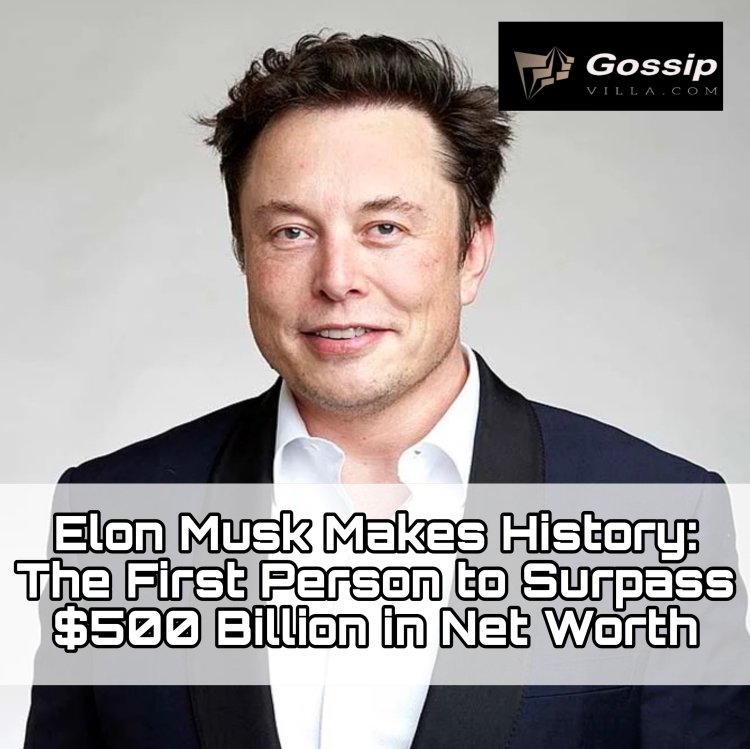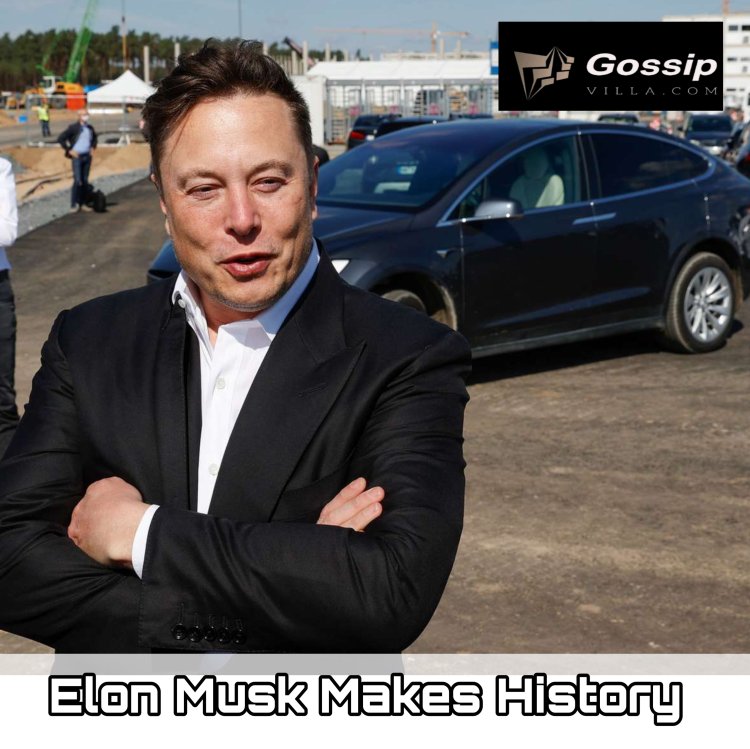Elon Musk Makes History: The First Person to Surpass $500 Billion in Net Worth
Elon Musk becomes the first person ever to hit $500B net worth, fueled by Tesla’s rebound and SpaceX’s soar. Explore his journey and what it means for global innovation.

Elon Musk Makes History: The First Person to Surpass $500 Billion in Net Worth
In a milestone that underscores the explosive growth of technology and innovation, Elon Musk has etched his name into the annals of economic history. On October 1, 2025, the CEO of Tesla and SpaceX became the first individual ever to achieve a net worth exceeding $500 billion, according to Forbes’ Real-Time Billionaires tracker. This staggering figure, peaking at $500.1 billion mid-afternoon before settling slightly lower at $499.5 billion by market close, places Musk a full $150 billion ahead of the world’s second-richest person, Oracle co-founder Larry Ellison, whose fortune stands at around $351 billion. As of October 2, 2025, Musk’s wealth continues to hover just above the historic threshold, reflecting the volatile yet upward trajectory of his empire.
This achievement isn’t just a personal triumph for Musk—it’s a testament to the transformative power of visionary entrepreneurship in the 21st century. From humble beginnings coding video games as a child in South Africa to helming multiple groundbreaking companies, Musk’s journey has been one of relentless ambition. But what exactly propelled him to this unprecedented level? And what does it mean for the future of wealth, innovation, and global markets? In this post, we’ll dive deep into the factors behind Musk’s ascent, his business portfolio, and the broader implications of such concentrated fortune.

Behind the Milestone
Musk’s net worth is inextricably linked to the performance of his companies, with Tesla remaining the cornerstone. As of September 15, 2025, Musk holds a 12.4% stake in the electric vehicle giant, making it the single largest contributor to his wealth. Tesla’s shares have surged over 14% year-to-date, closing up 3.3% on October 1 alone, which added an estimated $6-9 billion to Musk’s fortune in a single day. This rebound comes after a challenging first half of the year, marked by a 13% dip in vehicle sales and the underwhelming debut of Tesla’s robo-taxi pilot in Austin. Yet, investor confidence has roared back, fueled by Musk’s renewed focus on the company following his high-profile advisory role in the White House during the early months of the second Trump administration.
Tesla’s board has doubled down on Musk’s leadership, proposing a performance-based compensation package potentially worth up to $1 trillion if the company hits ambitious targets like an $8.5 trillion market cap over the next decade. Board Chair Robyn Denholm recently defended the plan, emphasizing Musk’s track record of achieving “seemingly impossible goals.” In a bold move, Musk himself purchased nearly $1 billion in Tesla stock on September 12 through a trust—his first open-market buy since 2020—signaling unshakeable belief in Tesla’s pivot toward AI, robotics, and autonomous driving.
But Tesla isn’t the whole story. Musk’s diversified portfolio has supercharged his wealth. SpaceX, valued at over $200 billion in recent private funding rounds, benefits from lucrative NASA contracts and Starlink’s global satellite internet expansion, contributing an estimated $100 billion to Musk’s net worth. Then there’s xAI, Musk’s artificial intelligence venture, which merged with X (formerly Twitter) earlier this year in a deal valuing the combined entity at $113 billion. Musk’s 53% stake here is worth about $60 billion, with whispers of a potential $200 billion valuation on the horizon. Neuralink’s brain-machine interface breakthroughs and The Boring Company’s infrastructure innovations add further layers, though they remain smaller slices of the pie.
This isn’t Musk’s first historic net worth milestone. He first crossed $100 billion in late 2020, $200 billion in 2021, $300 billion later that year, $400 billion in December 2024, and now $500 billion—just five years after becoming the world’s richest person in January 2021. At this pace, analysts project Musk could become the first trillionaire by 2033, as his compensation package vests.
Elon Musk’s Extraordinary Path
Elon Musk’s story reads like a sci-fi novel. Born in 1971 in Pretoria, South Africa, he taught himself to code at age 10 and sold his first game, Blastar, for $500 at 12. By 17, he emigrated to Canada, then the U.S., dropping out of Stanford after two days to chase the internet boom. Co-founding Zip2 (sold for $307 million in 1999) and X.com (which became PayPal, netting him $175.8 million in 2002) gave him the capital to launch SpaceX in 2002 and join Tesla in 2004.
SpaceX nearly bankrupted him in 2008 amid failed rocket launches, but a pivotal NASA contract turned the tide, leading to reusable Falcon rockets and Crew Dragon missions. Tesla, meanwhile, revolutionized electric vehicles with the Model S and Cybertruck, despite production “hell” and regulatory battles. Musk’s “first principles” philosophy—breaking problems down to fundamentals—has driven innovations like Starship for Mars colonization and Optimus robots for AI labor.
Challenges abound: Tesla’s sales slumps, X’s valuation drop post-acquisition, and Musk’s polarizing political stances, including his advisory role in the Trump administration, which drew backlash and a $126 billion wealth dip earlier in 2025. Yet, Musk’s ability to rebound—refocusing on business after White House duties—has restored investor faith.
What $500 Billion Means for the World
Musk’s fortune isn’t mere numbers; it’s a lens on inequality and innovation. Critics argue such wealth concentration exacerbates divides, with Musk’s 2021 tax bill alone estimated at $12 billion from stock sales. Musk counters by framing his riches as resources for humanity’s multi-planetary future, pledging in 2020 to sell most possessions and live “cash poor.”
On the flip side, Musk’s companies employ tens of thousands and drive sectors like EVs (reducing emissions) and space (advancing exploration). Tesla’s market cap alone rivals entire industries, while SpaceX has slashed launch costs by 90%. As the first to $500 billion, Musk sets a benchmark: Wealth tied to solving grand challenges can scale exponentially.
Looking ahead
Expect more volatility. Tesla’s AI bets, xAI’s Grok models, and Starship tests could propel Musk further—or falter amid competition from rivals like Oracle’s Ellison, who briefly overtook him in September 2025 after a $101 billion one-day gain. Yet, history favors the bold. Musk’s milestone reminds us: In an era of AI and space race, one person’s vision can redefine possibility.
Sources
What's Your Reaction?




















